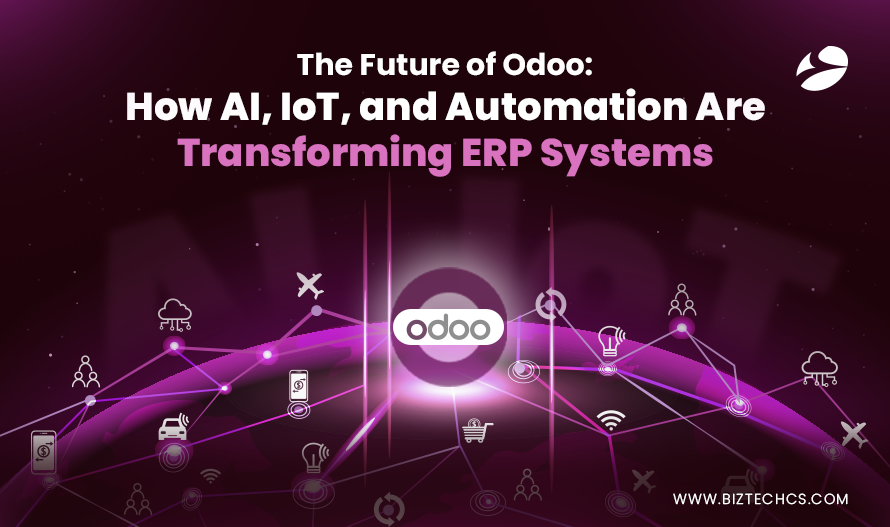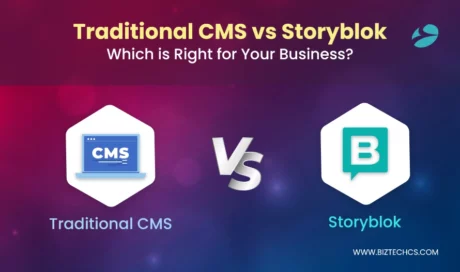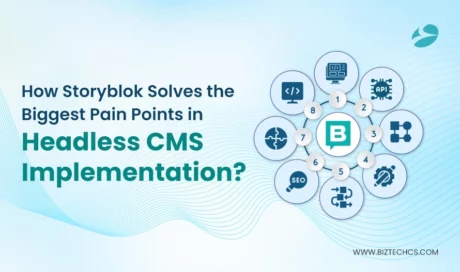The Future of Odoo: How AI, IoT, and Automation Are Transforming ERP Systems
19 Feb, 2025
10 min read
19 Feb, 2025
10 min read
Table Of Content

What if your ERP system could anticipate changes in the market and make real-time adjustments in addition to streamlining procedures? With Odoo, this is becoming a reality as automation, IoT, and AI transform how organizations function.
By examining data patterns and providing valuable insights, artificial intelligence (AI) in Odoo is transforming decision-making. Businesses can easily track and manage their assets thanks to IoT connectivity, which increases precision and productivity.
Conversely, automation increases productivity by eliminating the need for human intervention in repeated operations.
For businesses looking to leverage these cutting-edge capabilities, it’s essential to hire Odoo developers who can integrate these advanced features into their workflow efficiently.
We’ll look at how these innovative technologies improve Odoo’s functionality and provide real advantages to companies in this article.
Odoo is developing into a system that is prepared for the future with features like real-time data analysis and smarter workflows. These developments are ushering in a new era of intelligent enterprise management, not just increasing efficiency.
AI in Odoo is transforming business operations by automating tasks, improving decision-making, and enhancing user experience. It helps businesses process data faster, optimize workflows, and reduce manual efforts.
AI-powered chatbots in Odoo improve customer support by handling queries instantly. Predictive analytics assist in sales forecasting, inventory management, and demand planning.
OCR (Optical Character Recognition) automates invoice processing, reducing errors and saving time. AI-driven automation in Odoo also streamlines HR operations, such as resume screening and employee performance analysis.
Odoo’s AI is revolutionizing business operations through task automation, better decision-making, and improved user experience. Businesses benefit from faster data processing, improved workflows, and less human labor.
Chatbots with AI capabilities in Odoo enhance customer service by responding to inquiries immediately. Inventory control, demand planning, and sales forecasting are all aided by predictive analytics.
Additionally, IoT-enabled smart buildings can seamlessly integrate with Odoo’s AI to optimize energy usage, monitor building systems, and enhance overall operational efficiency. Invoice processing is automated by OCR (Optical Character Recognition), which lowers errors and saves time.
HR procedures like employee performance evaluation and resume screening are also made more efficient by Odoo’s AI-driven automation.
Odoo automation helps companies increase efficiency, cut down on errors, and save time. It makes follow-ups, inventory updates, and invoicing more efficient. Odoo’s built-in capabilities, such as scheduled actions and triggers, can be used to automate workflows.
To monitor performance without requiring human intervention, businesses can also configure automatic reporting.
Smooth communication is ensured by integration with third-party apps, emails, and SMS. Automation allows businesses to concentrate on expansion rather than day-to-day tasks.
Odoo is anticipated to increase its use of artificial intelligence (AI) and machine learning (ML) to optimize corporate processes.
Data entry, invoice matching, and customer service are just a few repetitive operations these technologies will automate.
Businesses can use predictive analytics to manage inventories, predict sales, and spot patterns. This change will increase decision-making, decrease manual labor, and improve accuracy.
To satisfy expanding company demands, Odoo is concentrating on making its platform more mobile-friendly.
App functionality and mobile interfaces will probably be enhanced in future releases. With Odoo development services, users will easily handle operations, sales, and money from any location. Businesses will be more responsive and efficient because of this mobility.
For providing adaptable and scalable solutions, Odoo is expanding its use of cloud-based and SaaS models. Thanks to these deployments, businesses can access real-time data from any device.
Automatic updates will maintain system functionality and guarantee security. This strategy will increase accessibility while lowering IT maintenance expenses.
As part of its Odoo Development Roadmap, these cloud-based solutions are a critical aspect of improving the overall user experience and enhancing the efficiency of businesses.
Odoo is improving its data analytics capabilities to assist companies in gaining more insightful information. Future advancements will offer trend analysis, real-time dashboards, and more intelligent reporting.
Faster data-driven decision-making and performance metrics tracking will be possible for businesses. Thanks to these enhancements, businesses will have a competitive advantage in managing their operations.
With AI, IoT, and automation, Odoo’s future is rapidly changing and revolutionizing how companies handle their ERP systems. IoT allows real-time data tracking for increased efficiency, while AI improves decision-making through predictive analytics and intelligent automation. Automation streamlines operations across industries and increases efficiency by reducing manual chores.
As Odoo transitions from Odoo 17 to Odoo 18, it is now more intelligent, scalable, and responsive to the demands of contemporary business thanks to these developments. Odoo will keep incorporating state-of-the-art solutions as technology develops, guaranteeing that companies stay ahead. To maximize productivity and expansion, it will be essential to adopt these advances.
By utilizing Odoo’s most recent developments, we at Biztech assist companies in remaining prepared for the future. Our experience guarantees smooth customization and deployment, enabling companies to prosper in the ever-changing digital environment.
AI is improving Odoo’s ERP by enhancing predictive analytics, automating workflows, and providing smarter decision-making tools. Features like AI-powered chatbots, invoice automation, and demand forecasting help businesses save time and reduce errors.
IoT will play a major role in Odoo’s future by enabling real-time data collection and automation in industries like manufacturing, logistics, and retail. Connected devices will help businesses track assets, monitor production, and optimize operations more efficiently.
Automation in Odoo reduces manual work by streamlining processes such as inventory management, invoicing, and customer service. This boosts productivity, lowers costs, and improves overall business efficiency.
Some AI-powered features in Odoo include automated invoice scanning, smart email filtering, and predictive stock replenishment. These tools help businesses make data-driven decisions and improve operational accuracy.
Blockchain will impact Odoo ERP by enhancing security, ensuring transparent transactions, and improving data integrity. It can be useful for supply chain management, secure payments, and contract verification.
Businesses can prepare for AI, IoT, and automation in Odoo by investing in employee training and integrating smart technologies into their workflows. Staying updated with Odoo’s latest features and leveraging data analytics will help them stay competitive.

Storyblok
24080
By Devik Gondaliya
02 Apr, 2025

Storyblok
25045
By Devik Gondaliya
01 Apr, 2025

Storyblok
25749
By Devik Gondaliya
27 Mar, 2025